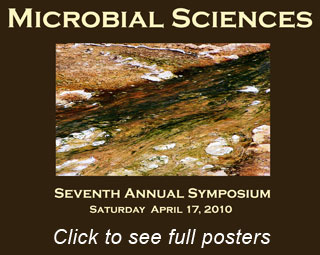Microbes (including bacteria, viruses, fungi, and protists) are ubiquitous on Earth and affect every part of our lives, yet they are mostly invisible. Microbial scientists believe the vast majority of microbes are still unknown to us. On Saturday, April 17, Harvard Microbial Sciences Initiative will host the Seventh Annual Microbial Sciences Symposium, an all-day event free and open to the public, to be held in the Radcliffe Gymnasium at the Radcliffe Institute for Advanced Studies on the Cambridge campus. Eight prominent microbial scientists hailing from a wide variety of disciplines are invited to share their investigations into these enigmatic microbes. This event will “stimulate discussion among members of the scientific community and help strengthen integrative science programs,” says Kolter.
The Symposium is the largest and most visible event sponsored by the Microbial Sciences Initiative (MSI) at Harvard, an interdisciplinary program focused on understanding the microbial world. Co-directed by Colleen Cavanaugh (OEB) and Roberto Kolter (Microbiology and Molecular Genetics, HMS), the MSI links researchers in FAS with SEAS, Harvard Medical School, and Harvard Public School of Health. The Symposium topics reflect the enormous value MSI places on interdisciplinary research spanning fields of molecular biology, engineering, physics, evolutionary biology, public health, environmental microbiology and microbial ecology. CCB Professor Joanna Aizenberg will discuss the design of nanosurfaces that control bacterial adhesion and settlement. Rob Knight (Univ. of Colorado) and Ruth Ley (Cornell University) will reveal mysteries of the human microbiome. HMS Professor Michael Gilmore will explain how certain commensals have evolved to become culprits in one of today’s leading public health problems- antibiotic resistance. Susan Lindquist (MIT) will present her research on the relationship between genotype and phenotype with regards to protein folding and environmental stress. How at least one group of prokaryotes, the cyanobacteria, utilizes the circadian clock to control gene expression will be explained by Susan Golden (Univ. of California at San Diego). OEB Professor Chris Marx will discuss how his laboratory integrates information about mobile genetic elements and evolutionary theory to make predictions of evolutionary outcomes. HMS Professor David Rudner will discuss how bacteria communicate with one another through regulated proteolysis.
The MSI Symposium begins on April 17th at 8:30 am with a light breakfast followed by the lecture series. The audience is free to explore Harvard Square area for lunch from 12:00 until 2:00 pm. At 5:00 pm the MSI is hosting a catered reception for speakers to meet with participants.


